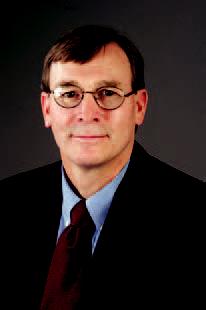Grant to move MU docs digital
Grant Savage, head of the University of Missouri School of Medicine Department of Health Management and Informatics, knows firsthand why we need electronic medical records.
Every year he suffers from allergies and goes to his doctor. His doctor flips through his paper medical records to review what happened last year, which medications worked and which did not.

Announced on May 28, the funds will create the Missouri Health Information Technology Assistance Center, which will:
- Help physicians select and purchase hardware and software by providing unbiased, comparative information and access to discounts and loans.
- Provide assistance via a website and a staffed toll-free number, as well as provide access to group purchasing plans and information on loans.
- Analyze physicians’ office procedures make sure office workflow is compatible with the use of electronic health records.
- Teach health care practitioners to use electronic records in meaningful ways.
- Provide information for obtaining federal reimbursement for adopting and effectively using electronic health records.
The award will be put into action through partnerships with organizations including the Hospital Industry Data Institute, the Missouri Primary Care Association, the Kansas City Quality Improvement Consortium and Primaris, the state’s federally designated health care quality improvement organization.
No one has been hired yet for the project, Savage said, because the final agreement is still in process. Even after the paperwork is completed, some of the funds will not be distributed until the HIT Assistance Center and its partners contract physicians for the center’s services.
Eventually the funding will translate into about 20 new jobs in Missouri, distributed among MU and the four partnering organizations, Savage said. These funds were part of $267 million in awards to 28 nonprofit organizations announced earlier this year by Health and Human Services Secretary Kathleen Sebelius.
Going digital, saving lives
Unlike many industries, the health care sector has been slow in the move to digital. For example, Savage said when he goes to get his car fixed, his mechanic has a printout of all the work he’s had done.
“Sometimes I think my car mechanic has better information on my car than I do on my own health care,” he said.
To get around the lack of comprehensive records, Savage writes out the names of all his medications and their dosages and gives it to his physician. “I’ve been in health care for 20 to 25 years, but most people don’t do this,” he said.
For many people, insufficient records can result in what is called “poly pharmacy,” unintended drug interactions or wasted money because people end up taking drugs they don’t need. If their physicians were aware of all their current medications, that could be avoided, Savage said.
The danger increases with age. Savage said many people older than 65 take an average of eight to 12 prescriptions, often from two or three physicians.
It often falls to primary care physicians to help patients manage all this. In Missouri, there are 5,300 primary-care physicians, and Savage said the project’s goal is to sign up 1,200 doctors for the center’s services. If that goal is reached, federal funding will continue for two more years; the project is designed to become self-supporting through contracts with physicians, Savage said.
Savage, the principal investigator on the project, said the ultimate goal is not about avoiding paperwork: It’s about safety, saving money and saving lives.
With electronic records, if someone comes into an emergency room unconscious or unable to communicate, the physician would be able to access information on any allergies to medications, previous conditions or other necessary information. Doctors would no longer be practicing medicine in the dark, Savage said.
In other cases, such records also could save patients time, money and risks. For example, Savage said, if someone has had a blood test or an X-ray ordered by one doctor and then went to another physician, electronic records would eliminate the need to repeat the X-ray or blood test. The new physician would be able to immediately access any lab results without waiting for a fax or photocopies to arrive.
Addressing security concerns, Savage noted that accessing an ATM involves using electronic records and sensitive data, but people do it all the time. Patients would have to opt into and authorize access to an electronic records system, which adds an extra layer of security.
Electronic health records could also help Missourians tackle chronic illness such as cardiovascular disease, cancer, kidney disease and obesity, said Dr. Karen Edison, director of MU’s Center for Health Policy and co-principal investigator of the project. Missouri currently ranks 40th in the country for prevalence of cardiovascular disease and cancer, 36th for kidney disease and 34th for obesity.
Electronic records would help physicians coordinate care for chronic diseases, provide benchmarks on health markers and give guidance for best management practices.
“You can’t improve something if you don’t have good metrics,” Savage said.


